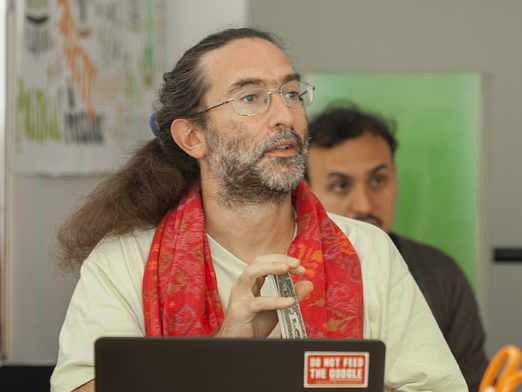Most ecovillages are progressive outposts on the frontiers of a necessary transition. Damanhur however is the centre of a nascent civilisation. With over 500 adult residents and tens of thousands of connected souls it is the largest ecovillage in Europe; it has created its own culture and its own ways of living in community and understanding and practising spirituality. The heart of the community is a massive and magnificent work, the Temple of Humanity, secretly carved into the mountain over fifteen years before being betrayed to the public.
Forty years ago the original founders held everything in common. Latterly the law has made that very difficult, but a strong communitarian ethic guides the flows of resources through a complicated organisational structure.
Damanhurian citizens reside as families in large, comfortable households with around 15 adults each plus children. Each household has a responsibility in the larger community, such as food production, processing, energy, or caring for the elderly.
Members or families support themselves financially through conventional or esoteric work, then pay rent to the cooperative which owns the properties, then pay the various organs for solidarity, education, ongoing temple construction, and other agreed projects. Then after that there is much volunteer participation and social & spiritual activities. If that sounds like a heavy commitment to community, you are paying attention. Damanhurians are as one in their commitment to the community, and their belief that Damanhur has a role to play in the unfolding of human destiny.
So many experts in esoteric disciplines and so many courses bring many guests to Damanhur, yet tourism is not a major source of income. There is some accommodation for visitors and tourists, but households welcome as many people as they can without taking profit.
Damanhur's own currency, the Credito, is used to pay for everything in Damanhur, and for internal accounting: since the law forbids them from digital money, accounts are kept by literally carrying large numbers of Credito coins between offices. Damanhurians are happy not to be using Euro-debt money, but the difference is mostly cosmetic, since every credito circulating MUST backed by one Euro trapped in a safe. Many local businesses accept creditos, not because purchase Damanhur produce, but because they know it is readily exchangable back to global money.
In its relatively long history, Damanhur has successfully weathered many financial crises, and emerged stronger. Early on, the banks unilaterally decided to foreclose on Damanhur debt, and the village was forced refinance from friends and family. From this crisis was born the credito. Then there was an expansionary phase, when business was good, and much was borrowed! Then the chickens came home to roost in 2008 and a concerted collective effort was made to pay off mortgages and become more self sufficient in food and building.
In many ways it seems that Damanhur's economy is now serving the village well enough. Members have time to put their attention on higher pursuits such as spiritual physics, world peace, personal development, and drawing music from plants.
More than increased efficiency through sharing, the ecovillage economies I have seen are grounded in solidarity. Solidarity comes either through large time-investments in personal relationships or, as in Damanhur, through a shared-devotion and collective service to a higher cause. Economy, if we could excoriate the existing profession, shun the bloodsucking banks, and defend ourselves from lawyers, politicians and organised crime, would be easy, natural and obvious. What the solidarity economy movement needs, at least in the developed world, is less economic expertise, and a much deeper understanding of solidarity.

Comments